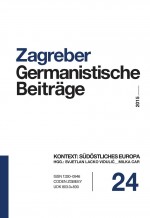Deutsch im Diskurs der Illyrischen Bewegung (1835–1843)
German in the Discourse of the Illyrian Movement (1835–1843)
Threat, Role Model, Means of Reconciliation
Author(s): Kristian Novak, Barbara Štebih GolubSubject(s): Language studies, Cultural history, Social history, Culture and social structure , Social differentiation, Sociology of Culture, Period(s) of Nation Building
Published by: Odsjek za germanistiku - Filozofski fakultet Sveučilišta u Zagrebu
Keywords: Illyrian Movement; language ideology;
Summary/Abstract: The Illyrian Movement generated specific narrative models containing elements of language ideology which corroborate the thesis about the inseparability of language and nation, typical of the period in question. This includes the description of the desired patriotic behavior in order to promote the national language. The use of foreign language either in the public or the private sphere is thus represented as irresponsible and endangering the national language. Consequently, the discourse of the Illyrian Movement exhibits predominantly negative attitudes towards the German language. However, discourse analysis shows that German was the dominant language in higher social classes and therefore inevitable as a means of activism.
Journal: Zagreber Germanistische Beiträge
- Issue Year: 2015
- Issue No: 24
- Page Range: 127-148
- Page Count: 22
- Language: German

